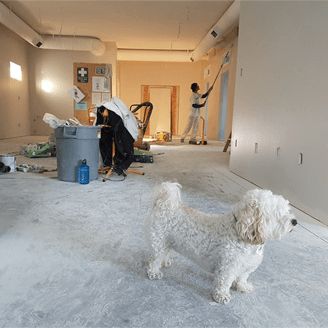5 Ways to Keep Sane During a Home Renovation Process

Your Guide to surviving your Home Renovation Process and the stress of home repairs, and what to expect while your house is under construction.
Home Renovation Process-What’s Next?
If you have filed a homeowners insurance claim and wondering what to expect during the home repair process, this is for you. Even if you have not filed a claim but are about to start home renovations, there is some useful information for you too. Read on as we give you a little insight into what to expect as your home undergoes repairs.
Home Renovation Process-First Thing’s First
Let’s imagine that you sit down on your couch after a hard day at the office and notice that the corner of the room seems to have water streaming down the wall. Not a fun way to start the evening, but you crawl into the attic and discover you have a water leak.
Not sure where the water is coming from, you pull out your phone and start searching for a repairman (check out our choosing a handyman guide). You find one whom you feel comfortable with after reading their reviews, they can also come out right away, and on their recommendation, you call your insurance company to file a claim (tips for filing a homeowners claim).
The insurance company takes your claim and schedules a time for a claims adjuster to come and survey the damage; they also advise you to take necessary steps to prevent further damage. You and your chosen contractor oblige, and you wait for your adjuster to come out. In some cases, your contractor and your adjuster will meet together to discuss the repair process.
Once the adjuster files his report and has your chosen contractor’s cost estimate to fix the damage, the repair process can begin. Keep in mind that insurance policies will differ in what they cover; it is essential that you understand your coverages, hop over to our home insurance buyers guide as we break down a homeowners policy for you.
Home Renovation Process-Getting Down to Brass Tacks
During the repair process, you may or may not be living in your home. If your loss is due to a major catastrophe and your home is unlivable, your policy may pay for you to stay in a hotel during renovations. Otherwise, you will be present while repairs are underway. Here are some tips for surviving the restoration process:
1. Maintaining a sense of normalcy.
Your house may be in shambles, but your life goes on. Be sure you have a plan in place for a place to sleep, eat and get dressed. If possible, stay with family or friends if you have little ones and are worried about them being around while repairs are made.
2. Keeping things tidy.
It is virtually impossible to keep it clean during a remodeling process, but working with your contractor on the logistics of the mess will help you keep your sanity. Ask them to set a clear area for all waste.
3.Protecting your airspace.
Some projects may require materials such as glue, paints or other smelly items. If you know you or a loved one has a sensitivity to these types of substances, plan to stay somewhere else while they are being used.
4. Containment.
Contractors will do their best to keep their mess in a confined area, but we all know dust will do what it wants to. Be sure to cover or remove any equipment or other valuables you want to keep dust free.
5. Communicate, Communicate, Communicate.
It is so important to keep the lines of communication open with your contractor and your claims adjuster. Be sure to relay in questions or concerns you have when you have them.
Finished Product
If during the repair process, the contractor found more damage, or it cost more than the original estimate, you will need to submit it to your claims adjuster. Most items have a set repair price, but if it is legit, the insurance company will work with you.
Once repairs are complete and you are satisfied with the outcome, it will be time to pay your contractor. If the repairs are due to a covered loss, your insurance company will cut you the check(less your deductible) and then you will pay your contractor. Be sure you have checked everything that needed repair before you pay if it is not it could cause problems with your insurance later down the road.
Do a walk-through of your home and compare it with your estimate of repairs. Ask your service provider to point out where specific things were fixed if it is not clear. Do not be afraid to ask questions.
If you need help with understanding the claim process or filing a claim, please give us a call. We will be happy to go over it with your or review your homeowner’s policy for any gaps in coverage you may be concerned with.

Last Updated on by Lauren Mckenzie

